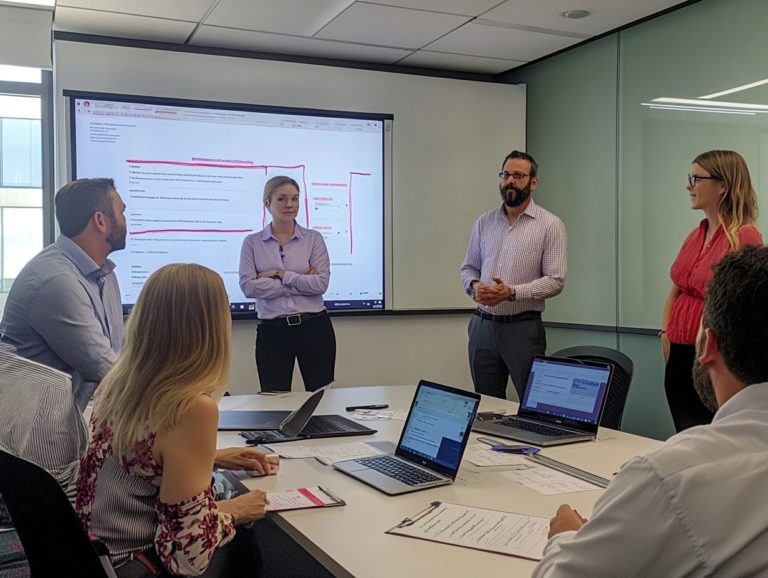How Technology Enhances Performance Management
In today s rapidly evolving business environment, mastering effective performance management is essential for achieving organizational success. Understand its definition and importance. This knowledge will prepare you to discover how technology is transforming the process.
Technology simplifies evaluations and tackles the challenges posed by traditional methods. With a suite of performance tracking tools and collaboration platforms at your disposal, you can streamline the evaluation process.
This article explores various technological solutions, shares best practices for seamless implementation, and showcases inspiring real-world success stories. Dive in now and discover how technology can revolutionize your approach to performance management!
Contents
- Key Takeaways:
- Understanding Performance Management
- The Role of Technology in Performance Management
- Challenges and Limitations
- Types of Technology Used in Performance Management
- Performance Tracking and Evaluation Tools
- Collaboration and Communication Platforms
- Implementing Technology in Performance Management
- Impact of Technology on Performance Management
- Frequently Asked Questions
- What is performance management and how does technology enhance it?
- How does technology transform the goal-setting process in performance management?
- Can technology help with performance evaluations?
- How does technology enable continuous performance management?
- What are some examples of technology used in performance management?
- Can technology improve employee engagement and motivation?
Key Takeaways:
- Streamline performance management with technology.
- Increase efficiency, accuracy, and transparency.
- Maximize technology s impact by adopting and implementing it correctly.
Understanding Performance Management
Performance management is an organized method that enhances employee success while aligning individual goals with your organization s objectives. It involves various processes and tools designed to evaluate performance, provide ongoing feedback, and ensure workplace transparency.
By integrating important measures of success into your workflows, you can identify trends, tackle performance bottlenecks, and leverage technology-driven solutions to empower employees and elevate their overall experience.
Effective performance management systems, such as Evalflow and WorkTango, foster a culture of continuous learning and development. This ultimately propels your workplace toward success.
The Role of Technology in Performance Management
In today’s dynamic workplace, technology plays a pivotal role in elevating performance management. It offers innovative solutions, such as mobile performance management tools, that streamline processes and enhance employee satisfaction.
By harnessing platforms that employ artificial intelligence and machine learning, you can gather real-time data and promote continuous feedback. Ultimately, this boosts employee engagement.
Utilizing employee success software from industry leaders like Deloitte and Gallup allows your organization to align performance management systems with strategic objectives. This fosters transparency and enables remote workers to excel in a flexible work environment.
Benefits of Using Technology
Integrating technology into your performance management systems unlocks numerous benefits. You gain enhanced data-driven decision-making and improved employee enablement through real-time feedback. Understanding the role of AI in performance management tools can further help you use performance metrics to track progress and identify areas for improvement.
This fosters a culture of continuous learning and professional growth. By adopting technology-driven solutions, you streamline performance evaluation processes. Ensure employees receive timely and constructive feedback that aligns with your organizational performance goals.
Embracing digital tools cultivates a more dynamics workplace atmosphere. Employees feel valued and engaged. With access to customizable dashboards, individuals can visualize their performance data, encouraging a sense of ownership over their development.
These platforms facilitate goal setting and alignment while enhancing collaboration among teams. This ultimately drives productivity to new heights.
This integrated approach nurtures a sense of belonging and satisfaction among employees. It influences their commitment to achieving shared objectives. In doing so, you create a thriving environment that benefits both your workforce and the organization as a whole.
Challenges and Limitations
Despite the many benefits technology brings to managing performance, it s important to recognize the challenges that come with it. Carefully navigating these challenges is crucial.
For instance, you might encounter inherent resistance to change. This resistance is often rooted in fears of job displacement or discomfort with new platforms. As a result, you may see a disengaged workforce.
If you don t prioritize comprehensive training, your employees could struggle to use digital tools effectively. This creates a knowledge gap that undermines the intended benefits of these systems.
The complexity of integrating various technological solutions can create information silos. These silos hinder your ability to achieve a holistic view of performance. If technology fails to enhance communication and collaboration, it could detract from the overall employee experience, leaving team members feeling isolated instead of supported.
Types of Technology Used in Performance Management
Various technologies play a pivotal role in elevating performance management processes. Understanding the benefits of using performance management tools highlights how each technology fulfills distinct functions that collectively drive organizational success.
Performance tracking and evaluation tools allow you to monitor employee progress and assess outcomes against established performance metrics. Meanwhile, collaboration and communication platforms create a more connected work environment.
Using cloud solutions and success software lets you access real-time data and facilitate seamless feedback mechanisms. This enables your team to align their efforts with the overarching goals of the organization.
Performance Tracking and Evaluation Tools
Performance tracking and evaluation tools are vital elements of a robust performance management system. They enable you to measure employee progress and make informed, data-driven decisions.
These tools offer invaluable insights into performance metrics, ensuring ongoing measurement that keeps everyone aligned with organizational goals.
By leveraging employee success software with strong evaluation features, your organization can create personalized development plans tailored to the unique needs of each employee.
Beyond nurturing individual growth, tools like performance dashboards and feedback systems enable you to effectively assess team dynamics and overall productivity.
Continuous feedback mechanisms, such as real-time performance reviews, allow you to swiftly address skill gaps. Analytical tools provide a broader perspective on workforce trends.
When used to their full potential, these resources foster a culture of accountability and engagement. They inspire employees to take charge of their own development. By ensuring that performance metrics are clearly defined and aligned with your strategic objectives, you significantly enhance both individual and organizational success.
Collaboration and Communication Platforms
Collaboration and communication platforms are essential for enhancing employee engagement and creating effective feedback processes within your performance management systems.
These tools enable real-time communication and promote transparent interactions among team members. This is critical for aligning their efforts with your organizational goals.
By leveraging HR technology that includes these collaboration tools, you can cultivate a work environment where feedback flows continuously. This ultimately boosts overall employee satisfaction and productivity.
These digital solutions facilitate the seamless exchange of ideas and insights. They allow you to recognize individual contributions and address performance issues promptly.
When employees feel valued and understood, their motivation soars, leading to a more proactive and innovative workforce. Integrating features like surveys and polls enriches this dynamic, ensuring that everyone s voice is heard and fostering a genuine sense of belonging.
Ultimately, tapping into these collaboration tools not only streamlines your performance management processes but also nurtures a culture of growth and continuous improvement throughout your organization.
Implementing Technology in Performance Management
Implementing technology in performance management demands a strategic approach that seamlessly blends best practices with tailored strategies for successful integration. You need to carefully assess your specific needs, ensuring that your technology solutions align harmoniously with your performance management systems.
Prioritize making decisions based on data to elevate your results. By cultivating a culture of acceptance and continuous learning, you enable employees to embrace the innovative technology woven into their workflows. This ultimately enhances overall performance and drives success.
Best Practices and Strategies
Adopting best practices and effective strategies is essential as you aim to integrate technology into your performance management systems. This involves selecting the right software that helps employees succeed, providing thorough training, and ensuring that the technology aligns with your organization’s overarching goals.
By fostering transparency and encouraging continuous feedback, you can optimize your performance management processes and significantly enhance employee satisfaction.
Utilizing data analytics can reveal profound insights into employee performance trends, enabling you to make informed decisions. Establishing clear performance metrics not only streamlines evaluations but also sets tangible goals for your employees.
The integration of mobile platforms enhances accessibility. This allows real-time access to performance updates, which boosts engagement.
It s equally important to regularly review and update your technology to keep pace with industry advancements. This fosters innovation and involves employees in the selection process, cultivating a sense of ownership that makes transitions smoother and more effective.
Impact of Technology on Performance Management
The impact of technology on performance management is transformative. By integrating performance management tools with HR systems, it fundamentally reshapes the employee experience, propelling growth and productivity within organizations.
By harnessing technology-driven solutions, you can establish feedback systems that are not only streamlined but also continuous. This cultivates an atmosphere where employees feel enabled and appreciated.
This shift has greatly increased employee engagement, satisfaction, and overall organizational performance. It underscores the essential role that innovative technology plays in contemporary performance management.
Success Stories and Case Studies
Numerous success stories and case studies vividly illustrate how technology-driven solutions can transform performance management systems. When you effectively implement employee success software, expect to see a remarkable boost in employee engagement, productivity, and overall performance metrics.
For instance, Fortune 500 companies that have harnessed advanced performance management tools have streamlined feedback processes and achieved remarkable organizational goals. This underscores the pivotal role of technology in propelling workplace success.
Consider a major tech firm that embraced a cloud-based performance management system a system that allows performance management to occur online, accessible from anywhere. Within just six months, they experienced a staggering 30% increase in employee satisfaction scores.
This shift was made possible through real-time feedback mechanisms and personalized development plans that enabled employees to feel more valued and aligned with corporate objectives.
Another compelling case involves a global retail brand that leveraged analytics to pinpoint performance gaps. This strategic approach led to a 20% boost in team productivity after implementing targeted training initiatives based on these insights.
These examples clearly demonstrate how leveraging technology nurtures individual growth, enhances team dynamics, and improves overall business outcomes.
Frequently Asked Questions
What is performance management and how does technology enhance it?
Performance management is the process of setting and tracking goals, evaluating and providing feedback on employee performance, and identifying areas for improvement. Technology enhances performance management by providing tools for setting and tracking goals, automating performance evaluations, and providing real-time data for decision making.
How does technology transform the goal-setting process in performance management?
Technology transforms how we set goals! It provides tools for creating clear and reachable targets called SMART goals, which are specific, measurable, achievable, relevant, and time-bound.
These tools help track progress and milestones while offering real-time feedback and updates. As a result, employees stay focused and motivated to achieve their goals.
Can technology help with performance evaluations?
Yes, technology can also automate the performance evaluation process. It offers digital forms, templates, and tools for managers to assess and rate employees efficiently.
This saves time and ensures consistency in evaluations while providing a centralized platform to track performance data.
How does technology enable continuous performance management?
Technology enables continuous performance management by delivering real-time performance data and feedback. This facilitates ongoing discussions and adjustments to goals and performance rather than relying on a yearly evaluation.
It encourages open communication and accountability among team members.
What are some examples of technology used in performance management?
Examples of technology in performance management include software for managing performance, tools for setting and tracking goals, 360-degree feedback systems that gather input from various sources, and data analytics platforms.
These tools streamline the performance management process and provide valuable insights for decision-making.
Can technology improve employee engagement and motivation?
Absolutely! Technology enhances employee engagement and motivation by offering real-time feedback and recognition.
It sets clear goals and expectations and promotes a culture of continuous learning and development. Additionally, it fosters personalized and transparent performance management, which can boost employee satisfaction and motivation.




